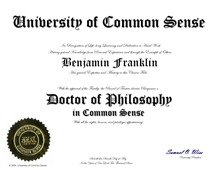School's Out Forever
Growing up, I was told that the most important ingredient for my future was an education. Do your homework, study hard and the road ahead will lead to a satisfying career and financial security. That was the promise, anyway. But as it turns out, in the kitchen of education, I cooked up concoction that would make even Andrew Zimmern cringe.
I went to high school at Boston University Academy, a prep-school that essentially guaranteed a fast track through college if you just played by the book. I didn’t play by the book. In tenth grade I was held back and junior year wasn’t any more promising. My teachers begged me to study, explaining to my parents that I just wasn’t applying myself. On the night of my last and deciding final of 11th grade, I sealed my fate watching a Seinfeld marathon. Clearly, getting through high school was going to be more trouble than it was worth.
When I came back from camp that summer, I was shipped to Chicago and the very next morning, in slacks, shirt and tie, reported for an internship at a financial company in the Loop. It was a complete correction of my downward spiral and the beginning of my career as a software engineer. I completed my GED and started taking night classes at DePaul. By my sophomore year, I was in the top of my class.
Everything seemed copacetic until I dropped out.
When School Works
It was an issue of motivation. When I’m told to do something, I ask why. If I don’t like the answer, I push back, and, depending on my conviction, will eventually just refuse. Turns out that up until college you don’t have much say in what you learn. Ask why and eventually the answer boils down: you don’t have choice.

I think that’s bullshit. A lot of what I was told to learn was, in retrospect, totally practical. Study a language and you’re given the power of self-expression. The sciences teach you how to manipulate the world around you. History explores human behavior, geography and politics. These are the types of answers that may have satiated my interrogation of academia and could have motivated my intellectual curiosity.
But reflecting on all the classes I’ve ever taken, there were many that were just arbitrarily required. Especially at $190/credit, it makes sense to keep you in class. School works when a student is motivated and motivation is fueled by purpose.
When It Doesn’t

When I started working, the paradigm completely changed. Now, I was motivated by a paycheck, a career, and my peers. I enjoyed what I was doing and was solving real world problems. Everything I did became practical (although often equally pointless).
It made sense to start taking classes again with this new found motivation and focus. I would spend two nights a week at DePaul, hacking away at a Computer Science degree. I was learning a lot but at a price.
In the age of information, where a good (free) search can yield more about a topic than you can learn in an entire academic career, that becomes a steep sacrifice. Then there’s opportunity cost. My classes ate into precious time I would otherwise spend learning on my own projects. With no other obligations and boundless energy, these years are quite arguably the most valuable of my life.
By the time my peers graduated, I had 4 years of work experience and was cashing in on it. I had come out ahead. I’ve never had a career opportunity jeopardized by an incomplete degree and I’m humbly optimistic that it never will.
Get Real

Ask ten people in your office what their degree is in and I bet at least half of them admit to something completely irrelevant to their job. Now ask them if they’re really passionate about what they do.
What if they had spent their four college years doing internships, traveling and searching the world for a calling that really fires them up? What if they had taken the fifty grand (or more) it took to graduate and had instead started a business, or two, or three? What if high school was an accelerated 3-year program followed by a 1 year intensive “real-life lessons” program covering topics like real estate, incorporation, financial management, insurance and law?
Of the four-man engineer team I was last a part of, only one had a degree and was, fittingly, the weakest member of the team. That’s how it works in the world of software. It should work for other fields, too.
There’s a lot of great things out there to learn, but theory is one thing and practice is another.
What About You?
Update (August 1st, 2010)
Since writing, I’ve found several articles regarding the flaws in the academic system. Marty Nemko of U.S. News describes one’s undergraduate education as America’s most overrated product. I thought it was worth highlighting some of my favorite points:
- “What percent of students would you guess graduate from college within six years? Forty percent. Six out of ten never graduate.”
- On the social value of attending university: “Fact: 27% of all undergraduate students binge drink regularly”
- “We need to capitalize on students’ desire to learn what they’re excited about and motivated to learn at that point in time. When kids are at eighteen or twenty, they’re at their most idealistic. It’s a great time to teach them about things that are going to foment that idealism. It’s a great time to teach them about relationships. It’s a great time to teach them about careers.”
- “Colleges produce a shoddy, overpriced product and it’s time we held them accountable.”
